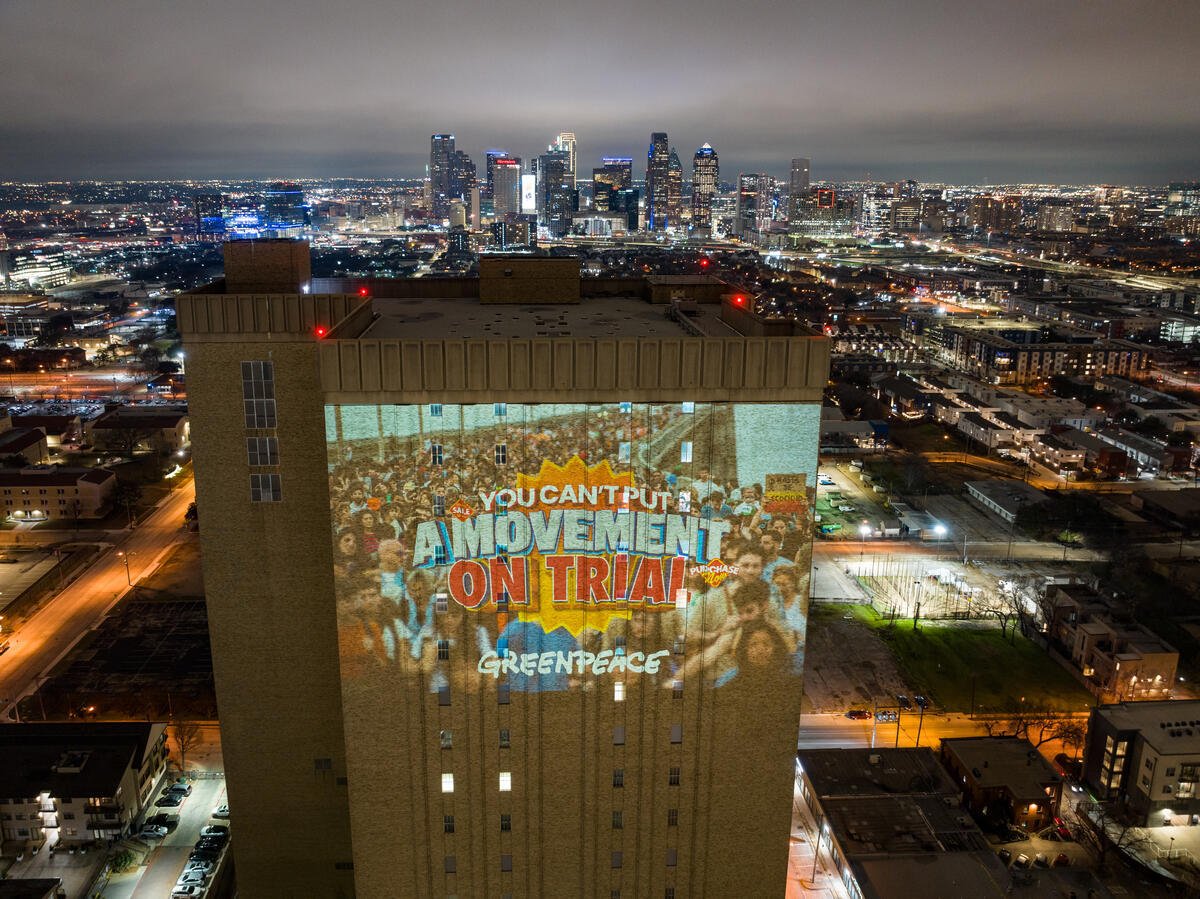The North Dakota Greenpeace lawsuit has sparked widespread debate and discussion around environmental activism, corporate responsibility, and legal frameworks governing protests. This case is not only pivotal for understanding the complexities of modern environmental advocacy but also highlights the tension between private interests and public welfare. As we delve deeper into this topic, we will explore the details of the lawsuit, its implications, and the broader context in which it unfolds.
This lawsuit centers on allegations brought against Greenpeace and other environmental organizations by a North Dakota pipeline company. The company claims that these organizations facilitated illegal activities that disrupted their operations. This legal battle raises critical questions about the boundaries of free speech, the right to protest, and the role of corporations in shaping environmental policies.
By examining the North Dakota Greenpeace lawsuit, we aim to provide a balanced perspective that considers the arguments from both sides. This article will also explore the historical background, legal precedents, and potential outcomes of this case, offering readers a comprehensive understanding of its significance in today's environmental landscape.
Read also:Gerard Butler The Ultimate Guide To The Hollywood Stars Career Life And Legacy
Table of Contents
- Background of the North Dakota Greenpeace Lawsuit
- Legal Arguments and Key Issues
- Environmental Impact and Concerns
- Corporate Perspective and Interests
- Legal Precedents and Relevant Cases
- Public Opinion and Societal Implications
- Economic Factors and Considerations
- Regulatory Framework and Policy Implications
- Future Outlook and Potential Outcomes
- Conclusion and Call to Action
Background of the North Dakota Greenpeace Lawsuit
The North Dakota Greenpeace lawsuit emerged as a result of disputes surrounding the Dakota Access Pipeline (DAPL) project. The pipeline, which transports crude oil across several states, has been the subject of intense protests led by environmental groups and indigenous communities. Greenpeace, along with other organizations, has been accused of funding and organizing activities that allegedly obstructed pipeline operations.
Key Events Leading to the Lawsuit
The timeline of events leading to the lawsuit includes:
- 2016: Protests against the Dakota Access Pipeline gain national attention.
- 2017: The pipeline is completed despite ongoing opposition.
- 2020: Energy Transfer, the company behind the pipeline, files a lawsuit against Greenpeace and other groups.
These events set the stage for a legal battle that has significant implications for environmental activism and corporate accountability.
Legal Arguments and Key Issues
The North Dakota Greenpeace lawsuit hinges on several key legal arguments. The plaintiff, Energy Transfer, claims that Greenpeace's actions constitute racketeering under the Racketeer Influenced and Corrupt Organizations Act (RICO). This accusation is based on allegations that Greenpeace facilitated illegal protests and sabotage efforts.
RICO Act and Its Application
The RICO Act was originally designed to combat organized crime but has been increasingly used in civil cases. Critics argue that applying RICO to environmental activism undermines free speech and the right to protest. On the other hand, proponents of the lawsuit claim that it is necessary to protect businesses from unlawful interference.
This section explores the legal framework surrounding the RICO Act and its relevance to the North Dakota Greenpeace lawsuit.
Read also:Trendon Watford The Rising Nba Star Shaping The Future Of Basketball
Environmental Impact and Concerns
One of the central issues in the North Dakota Greenpeace lawsuit is the environmental impact of the Dakota Access Pipeline. Critics argue that the pipeline poses significant risks to water sources, wildlife, and local ecosystems. Proponents, however, emphasize the economic benefits and energy security it provides.
Scientific Evidence and Expert Opinions
Studies conducted by environmental scientists highlight the potential consequences of oil spills and leaks. For instance, a report by the National Academy of Sciences found that pipeline spills can have long-lasting effects on aquatic life and soil quality. These findings underscore the importance of rigorous environmental assessments and safeguards.
This section examines the scientific evidence supporting both sides of the debate and evaluates their validity.
Corporate Perspective and Interests
Energy Transfer, the company behind the Dakota Access Pipeline, argues that the North Dakota Greenpeace lawsuit is necessary to protect its business interests. The company claims that illegal protests and sabotage efforts have caused significant financial losses and operational disruptions.
Corporate Responsibility and Transparency
While corporations have a right to protect their assets, they also have a responsibility to operate in an environmentally sustainable manner. Critics of Energy Transfer point out that the company has a history of regulatory violations and environmental controversies. This raises questions about the company's commitment to corporate responsibility and transparency.
This section analyzes the corporate perspective and evaluates the company's track record in relation to environmental and social issues.
Legal Precedents and Relevant Cases
The North Dakota Greenpeace lawsuit is not the first instance of corporations suing environmental organizations. Similar cases have been filed in other jurisdictions, with varying outcomes. For example, the Shell vs. Greenpeace case in the Netherlands resulted in a landmark ruling that upheld the right to protest while imposing certain limitations.
Comparative Analysis of Legal Cases
By examining these precedents, we can gain insights into the potential outcomes of the North Dakota Greenpeace lawsuit. This section compares relevant cases and highlights the legal principles that are likely to influence the court's decision.
Additionally, this section explores the implications of these legal precedents for future environmental litigation.
Public Opinion and Societal Implications
Public opinion plays a crucial role in shaping the outcome of high-profile cases like the North Dakota Greenpeace lawsuit. Surveys and polls indicate that a majority of Americans support environmental protection and the right to protest. However, opinions differ on the extent to which these rights should be exercised.
Social Media and Public Discourse
Social media platforms have become a powerful tool for disseminating information and mobilizing public support. Both sides of the debate have utilized social media to advocate their positions and engage with the public. This section examines the role of social media in shaping public opinion and influencing the legal process.
Furthermore, this section explores the broader societal implications of the lawsuit, including its impact on democratic values and civil liberties.
Economic Factors and Considerations
Economic considerations are central to the North Dakota Greenpeace lawsuit. The Dakota Access Pipeline is a multi-billion-dollar project that generates jobs and revenue for local communities. However, the environmental costs associated with the pipeline must also be taken into account.
Cost-Benefit Analysis
A cost-benefit analysis of the pipeline reveals both its economic advantages and environmental drawbacks. This section evaluates the economic factors involved in the lawsuit and assesses their relevance to the overall debate.
In addition, this section discusses the potential economic consequences of the court's decision, both for the parties involved and for the broader energy sector.
Regulatory Framework and Policy Implications
The North Dakota Greenpeace lawsuit highlights the need for a robust regulatory framework that balances corporate interests with environmental protection. Current regulations governing pipelines and protests have been criticized for their shortcomings and inconsistencies.
Proposed Reforms and Policy Recommendations
Experts have proposed various reforms to address these issues, including stricter environmental standards and enhanced transparency requirements. This section examines these proposals and evaluates their feasibility and effectiveness.
Furthermore, this section discusses the role of policymakers in shaping the future of environmental regulation and activism.
Future Outlook and Potential Outcomes
The outcome of the North Dakota Greenpeace lawsuit will have far-reaching consequences for environmental activism and corporate accountability. Depending on the court's decision, the case could set a precedent for future litigation involving similar issues.
Possible Scenarios and Implications
Several possible scenarios could arise from the lawsuit, each with its own implications for environmental advocacy and corporate practices. This section explores these scenarios and assesses their potential impact on the legal landscape.
Additionally, this section considers the long-term implications of the lawsuit for the relationship between corporations, activists, and the public.
Conclusion and Call to Action
In conclusion, the North Dakota Greenpeace lawsuit represents a critical juncture in the ongoing struggle for environmental justice and corporate accountability. By examining the legal, economic, and societal dimensions of the case, we have gained a deeper understanding of its complexities and significance.
We invite readers to engage with this topic by sharing their thoughts and opinions in the comments section. Additionally, we encourage readers to explore related articles on our website for further insights into environmental issues and legal developments.
Together, we can contribute to a more informed and engaged society that values both environmental sustainability and democratic principles.


